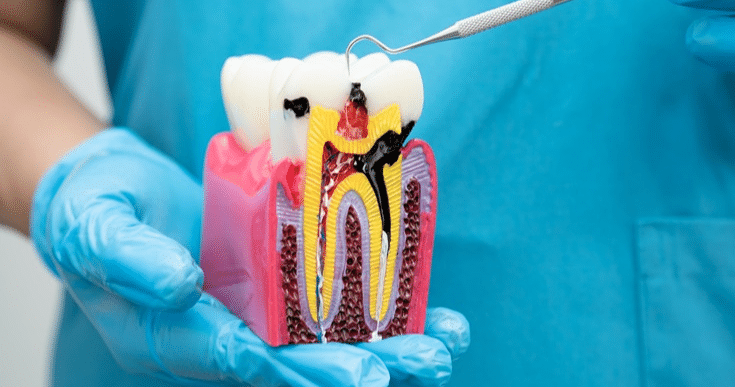
Are you experiencing persistent tooth pain or sensitivity? Is your tooth discolored or swollen? If so, you may be a candidate for root canal treatment. While the words “root canal” can often trigger anxiety and fear in people, it is a common dental procedure that can save your natural teeth from extraction. In this blog post, we will explore what a root canal involves, who needs one, how to prepare for the procedure, and what to expect during and after treatment. So sit back, relax, and let’s dive into everything you need to know about root canals!
What Is A Root Canal?
A root canal is a dental treatment that involves removing the damaged or infected pulp from inside your tooth. The pulp is a soft tissue that contains blood vessels, nerves, and connective tissue which helps to nourish your teeth.
If the pulp becomes damaged or infected due to decay, injury, or gum disease, it can cause severe pain and discomfort. In such cases, a root canal procedure may be needed to remove the affected pulp and save the remaining tooth structure.
During a root canal procedure, your dentist will numb the area around your tooth before making an opening in the crown of your tooth to access its inner chamber. They will then use special tools to remove the affected pulp from inside your tooth before cleaning and disinfecting it thoroughly.
After cleaning out all of the diseased material within this space (root canal), they’ll fill this hollowed-out area with medicated materials designed specifically for this purpose. Once filled up properly; depending on how much damage was done, to begin with – either placing another layer over top called “dental filling” OR capping off completely using something like porcelain crowns- ensuring no further infection occurs!
Who Needs A Root Canal?
A root canal is a dental procedure that involves removing infected or damaged tissue from the inside of a tooth. While many people dread the thought of getting a root canal, it can be an effective way to save your natural teeth and avoid more invasive procedures like extractions.
So who needs a root canal? Several signs and symptoms may indicate you need this treatment. One common indication is persistent pain in the affected tooth, especially when biting down or applying pressure. You may also experience sensitivity to hot or cold temperatures, swelling around the affected area, and visible damage such as cracks or chips in the tooth.
In addition to these physical symptoms, your dentist will consider other factors such as age, medical history, and overall oral health when determining whether you need a root canal. For example, if you have a weakened immune system due to certain medications or conditions like diabetes then you might be at higher risk for developing infections in your teeth.
If you’re experiencing any of these symptoms it’s important to see your dentist right away so they can evaluate whether you need a root canal or other type of treatment. While it may not be pleasant to undergo this procedure initially but with proper care and maintenance afterward, you’ll be able to enjoy healthy teeth again without requiring extraction which would otherwise lead to even more invasive treatments later on!
How To Prepare For It
Preparing for a root canal may seem daunting, but it’s important to remember that this procedure is routine and can save your teeth from further damage. Here are some tips on how to prepare for your upcoming root canal:
Firstly, make sure you inform the dentist of any medications you’re taking or medical conditions you have. This will help them determine the best course of action for your specific situation.
Secondly, avoid eating or drinking anything before the procedure as instructed by your dentist. This will prevent any complications during dental work.
Thirdly, plan for transportation after the procedure as you may experience some numbness or discomfort in the treated area.
Try to relax before and during the appointment. Bring along music or a book if it helps calm your nerves.
By following these simple steps, you’ll be more prepared and at ease when undergoing a root canal treatment. Remember that communication with your dentist is key to ensuring a successful outcome.
Root Canal Procedure
The root canal procedure is an essential dental treatment for people with severely damaged or infected teeth. Before the procedure begins, your dentist will apply a local anesthetic to numb the area around the affected tooth. This will help you feel more comfortable during the procedure.
Next, your dentist will make a small hole in the top of your tooth and remove any decayed or infected tissue from inside it using specialized instruments. The canals are then cleaned and disinfected thoroughly to prevent further infection.
Once this is done, your dentist fills in the space left by removed tissue with a special material called gutta-percha. They seal up the opening on top of your tooth and place a crown or filling over it to protect it from further damage.
While root canal procedures may seem intimidating at first glance, they are often necessary for restoring damaged teeth and preventing further dental issues down the line. If you think you might need a root canal treatment, don’t hesitate to reach out to your dentist today!
Finishing Off
After your root canal treatment, you may feel some mild discomfort and sensitivity for a few days. Your endodontist will provide you with detailed instructions on how to care for your tooth post-treatment.
It’s important to practice good oral hygiene by brushing twice a day and flossing regularly. Also, remember to schedule regular dental check-ups so that your dentist can monitor the health of your treated tooth and ensure its long-term success.
In summary, if you have severe tooth pain or prolonged sensitivity to hot or cold temperatures, it may be time to see an endodontist. Root canal treatment is highly effective in saving damaged teeth and restoring oral health. By understanding what happens during the procedure and taking proper care of your tooth afterward, you can enjoy years of healthy smiles ahead!




